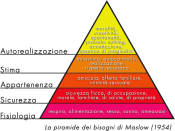Personality:
Second Major Paper
Introduction:
Psychologists have attempted to explain personality for hundreds of years using many different aspects and approaches. Personality psychology, which is the scientific study of the psychological forces that make people uniquely themselves, has many varied theories on the different characteristics' people have. Humanistic psychology is one of the approaches used to understand and explain personalities. The humanistic approach to personality emphasizes the belief that people have free will and play an active role in how they behave (compared to other approaches that believe people do not have free-will or control over their selves). This paper will take a closer look at two major contributors to the humanistic approach, Carl Rogers and Abraham Maslow.
In the book The Other Wes Moore the author delves into the life of two men: one, a Rhodes Scholar, the other a criminal, in jail for life without the possibility of parole.
The personalities of the two boys will be analyzed by focusing on key experiences in their lives, and explaining how these experiences fit into humanistic thinking.
The Humanistic Perspective:
Humanistic, humanism and humanist are terms in psychology relating to an approach which studies the whole person, and the uniqueness of each individual. The humanistic approach gets its name from the belief in the basic goodness of and respect of humankind. The roots of humanistic psychology came from existential psychology or the understanding and acceptance of one's own existence and responsibility. Humanistic psychology focuses on an individual's potential and stresses the importance of growth and self-actualization.
The fundamental belief of humanistic psychology is that people are innately good. Mental and social problems result from deviations from this natural tendency. Psychologists with a humanistic approach look at human behavior not only through the eyes of the observer and through the...


